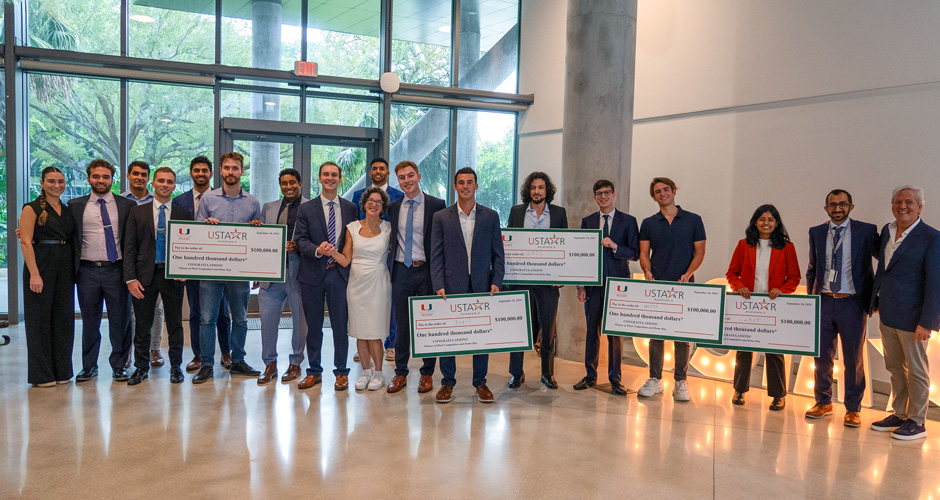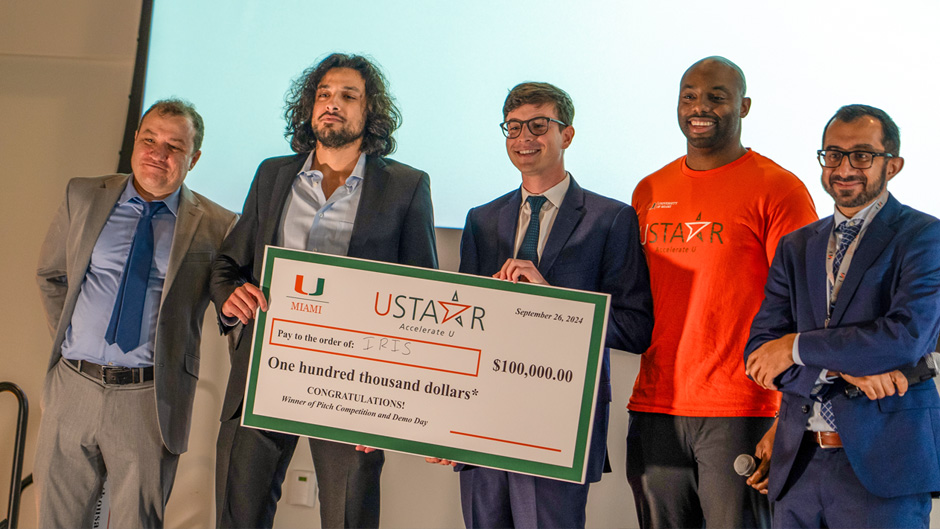When Aaron Fils was 12 years old, he entered an inflatable wrestling ring at a party and challenged his friend to a sumo wrestling match. After falling down hard, Fils got up and thought he was fine.
But later on, a friend’s parent found him looking dazed and confused and took him straight to a hospital, where doctors determined he had endured a concussion and treated him.
“I got really lucky,” said Fils, now a fourth-year student at the University of Miami Miller School of Medicine. “But today, there are 4 million sports-related concussions each year, and about half of them are going unreported, undiagnosed, or are mismanaged, and current field site tests are unreliable and subjective.”
That’s why Fils and two friends from his undergraduate years at the University––Mustafa Abdel-Mottaleb and James Lai, who is also studying at the Miller School––decided to create an application that can scan a patient’s eyes from a smartphone and provide an objective concussion risk assessment in under two minutes.
“Using that information, coaches and parents can decide if it's safe for their kids to go back into the game,” added Fils, who is interested in trauma medicine. “This can help to avoid a secondary injury.”
The trio—now business partners in IRIS Analytics—just received a major boost. As part of the University Student Startup Accelerator, or USTAAR, pitch competition last week, they were one of four student teams to receive a $100,000 grant to continue building their startup business. This was after IRIS Analytics and 10 other student teams received a $10,000 grant last spring from USTAAR to develop their idea into a prototype.
“This will allow us to scale up into a full product, and it’s also going to let us help millions of players and patients,” said Abdel-Mottaleb, now a postdoctoral student at the Massachusetts Institute of Technology, whose work focuses on brain computer interface innovation.
Other top winners at the inaugural USTAAR pitch competition held on Sept. 26 included Hashi, a tool to help capture the attention of potential customers before they leave a website, making company marketing budgets more effective; and SmArt, a nanoparticle fertilizer that is more efficient than current formulas and will reduce fertilizer waste for farmers, pitched by graduate aerosol engineer Shruti Choudhary.
“We tested this technology on the field in Illinois, and what you will see is that we got increased [crop] yields, but the best part was that where farmers required 100 to 200 pounds of conventional fertilizer per acre, with SmArt, it only requires 2 to 5 pounds per acre,” she said.
Another winner was 3rd-i, a smartphone app to help keep ride-sharing users safe and allow their loved ones to track them. Pitched by co-founder Dillon Abend, a junior studying finance at the Miami Herbert Business School, the app will add an extra layer of safety for riders, who are often apprehensive about the high occurrence of sexual assaults and other crimes that occur when traveling late at night. The 3rd-i app would include a button for riders to connect directly to emergency dispatchers as well.
“We did our own University of Miami case study and found that close to 80 percent of people felt unsafe in an Uber or Lyft, and close to 70 percent had an incident or uncomfortable experience,” Abend said. “This is truly unacceptable to me, so I wanted to find an original solution.”
Runners-up, which will split a $100,000 purse, were ForeVision Eye, a smartphone tool that can help primary care physicians and nurses to identify cataracts and other conditions on the front of the eye; Care Tales, personalized books for pediatric patients to explain each child’s unique medical condition and make hospital or office visits less frightening; and PadStats, a tool to help owners and other professionals in the real estate field more accurately appraise a property using artificial intelligence tools and historic real estate data.

The USTAAR program was founded in February from a generous donation by Angel and Victor Alvarez, two brothers and University alumni who founded ABB Optical. After the pitch competition, Alvarez said the student teams exceeded his expectations and went on to congratulate the winners himself.
Biomedical engineering and otolaryngology professor Suhrud Rajguru is the director of USTAAR, and a successful entrepreneur himself who founded RestorEar Devices. Rajguru and his team work to ensure that through this program, student entrepreneurs receive the mentoring needed for their businesses to thrive.
“USTAAR will ensure that our students have the resources, education, mentoring, and, most importantly, capital they need to bring their ideas forward and create a socioeconomic impact in South Florida and beyond,” said Rajguru, also the University’s assistant vice provost for research workforce development. “We welcome all students and trainees at the University to bring their concepts and ideas and apply to be a part of the USTAAR program.”
Applications for the 2024-2025 cohort are now open; deadline is Oct. 31.

